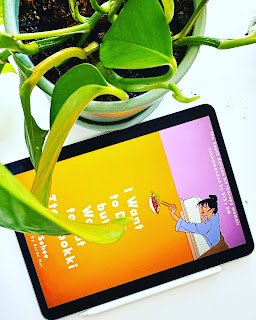nonfiction book review: I Want to Die but I Want to Eat Tteokbokki
Overall: 4
This book absolutely took over my Instagram feed for a while, likely because of the release of the unabridged English edition, which came out in 2022. It's an eye catching title, and I'm always one for well illustrated covers, so I placed a hold and waited for it to be delivered to my library account.
In a relatively succinct 200 or so pages, the book gives a glimpse into a series of Sehee's therapy sessions during a difficult period of her life. She discusses self esteem, anxiety, constant, low grade depression, ADHD, binge eating disorders, and body dysmorphia in these sessions. As the sessions progress, following a generally similar formula each time, a different significant quote or overriding issue is discussed as the focal point of the chapter. Each chapter leads with an introduction of the topic or issue in a few pages followed by the actual therapy transcript recorded by the author . Then, there's usually a summary of one significant moment from the session and a brief bit of commentary or reflection. It's an interesting read, likely because of the unique and voyeuristic experience of actually reading someone else's private therapy sessions.
This isn't necessarily fully a self help book or a memoir. There's an appeal, especially if you don't have access to therapy, to try to glean advice from what the therapist tells Sehee about ailments you both might share. But there isn't much in the way of actionable advice here. Often, these conversations just go back to her therapist telling her that many of her problems relate to her black and white view of the world and tendency to extremes. There's also the potential connection point in a solace of seeing someone else navigate problems that you both share or know that you're not alone in what you're going through. There's definitely some benefit there, but it's still strange to read an entire story constructed out of therapy transcripts. It does make it a quick read, though.
We learn about Sehee's work as a social media marketer at a publishing house and how, despite liking her job, she has a hard time feeling comfortable and secure in her work. She briefly shares about her difficult family relationships and her anxieties around forming new friendships and keeping them. But, unlike most memoirs, it's hard to derive an overall conclusion from the book. It really just feels like a file of transcripts to dig through. It was an interesting read, but when I finished it, I was sort of like... okay?
Interestingly, after the main book has concluded, there's a note from Sehee's therapist expressing that he was embarrassed to reread the transcripts in the published book afterwords and found he would've approached things differently now or found errors in how he handled certain situations. He said to take the book as a conversation between two flawed people. After this additional essay, there are a few couple page essays that comprise the end of the book. They're musings on life and health and family and friendship and somewhat connected to issues discussed in the transcripts, but they're a confusing addition that feel out of placed tacked onto the end of the book.
This book is by a South Korean author and was translated into English after the book had so much success in South Korea and other Asian countries. I think this was the first translated work that I've read for fun and possibly ever read. I really enjoyed that experience of being able to see an experience rooted in a different country, but because the book is so interior and about emotions, it's incredibly universal, and I often forgot that the book was a translation at all.




Comments
Post a Comment